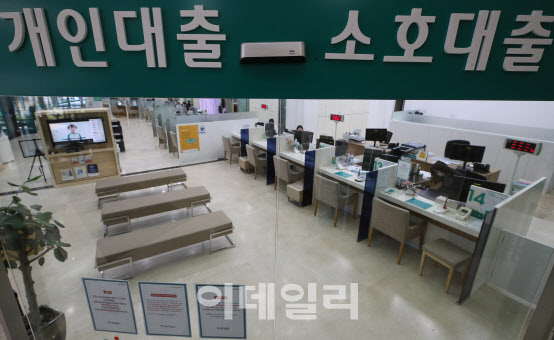|
[이데일리 이승현 기자] This year, it was found that the number of newly opened negative bankbooks at the five major banks exceeded 31,000. As the KOSPI index exceeded 3000 recently, the demand for funds for investment in the stock market increased, and it is interpreted as the influence that stimulated the prerequisite demand as the financial authorities began strengthening loan regulations.
Promotion of the principal split of credit loans… “Considering repayment ability”
According to the financial sector on the 24th, a total of 31,305 new credit loans (limited transaction loans or automatic bank account loans) through the negative bankbooks of KB Kookmin, Shinhan, Hana, Woori and NH Nonghyup on 14 business days from the 4th to the 21st. The case was handled. The average number of new marketers opened exceeds 2,000 per day. As of the end of last year, it doubled from 1,000 cases a day.
The negative bank account balance of the five major banks has increased by over 670 billion won this year. The balance of Matong increased from 46 trillion 53.1 billion won on December 31 of last year to 47,2076 billion won on the 21st.
The craze for opening negative bankbooks is largely due to the increased demand for’debt investments’ due to the booming stock market. In addition, the financial sector is seeing it because the financial authorities are predicting additional regulations in the household debt management plan in March, and the demand to obtain loans in advance has increased.
Particularly, the reason is that the financial authorities decided to make it mandatory for large credit loans in this year’s business plan.
|
Currently, there are many cases where credit loans only pay interest and the principal is paid off at the maturity date. In the future, in the case of large credit loans, the principal should also be repaid in installments like a mortgage loan. The intention is to prevent excessive demand for loans such as debt investment and ‘spiritual loans’ (collecting the soul) and lower the risk of insolvent by ensuring that the loan is handled within the repayment capacity of the borrower. It is a reinforcement of loan regulations following oral intervention in financial institutions such as banks, inspection of loan status, regulation of negative bankbooks, etc. However, the authorities are planning not to regulate uniformly. In this regard, it is reported that the financial authorities are considering imposing the amortization obligation on large credit loans exceeding the repayment capacity of the borrower’s income. For example, when a borrower with an annual salary of 500 million won borrows 50 million won by credit loan, it is necessary to impose an amortization obligation. However, financial authorities recognize that regulation is necessary when borrowers borrow more than their income.
The maturity is also expected to be reflected. In the case of short-term credit loans, amortization is not applied because amortization is meaningless, but if the loan is changed to a long-term loan through extension, it may be possible to apply amortization.
It is not applied retroactively. Existing credit loans are not affected, and new credit loans are applied after the system is introduced. In addition, negative bankbooks are excluded from the obligation to repay the principal in installments. An official from the financial authorities said, “We are currently collecting opinions from the financial sector and reviewing policy alternatives,” and said, “We will announce detailed plans in March.”
Banknotes move to reduce credit loans
The overall credit lending of banks is showing a somewhat subsidence due to pressure from the financial authorities in all directions.
As of the 21st, the credit balance of the five major banks totaled 134.9583 billion won, an increase of 1.31 trillion won from the end of December last year (133,6482 billion won). The authorities have proposed a monthly increase of 2 trillion won as the goal of managing the total amount of credit loans in banks.
The balance of credit loans increased by KRW 450 billion in four business days earlier this month, but the rapid rise is somewhat calming down as the authorities tightened the reinforcement around high-priced professional loans.
In fact, banks are taking measures such as reducing the credit limit for office workers and professionals, or stopping new applications for negative bank accounts.
Since the 15th, Shinhan Bank has set the maximum limit of four credit loan products for office workers, such as’Eliteron I·II’ and’Convenient Office Worker Loan SⅠ·Ⅱ’ from ‘150 million to 200 million won’ to ‘100 million~. It was lowered to 150 million won. Woori Bank reduced the limit on negative bankbook loans from 100 million won to 50 million won.
Internet bank Kakao Bank has lowered the maximum credit loan limit for high-credit workers from 150 million won to 100 million won since the 22nd. Suhyup Bank temporarily stopped applying for a new loan using the negative bankbook method of’Sh The Dream Credit Loan’, a credit loan product. An official from the banking sector said, “As the new loan limit itself is decreasing, the entire credit balance is being managed.”
|



